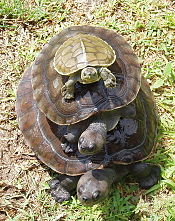Painted terrapin
| Painted terrapin | |
|---|---|

| |
| Male, at the San Diego Zoo | |
| Scientific classification | |
| Domain: | Eukaryota |
| Kingdom: | Animalia |
| Phylum: | Chordata |
| Class: | Reptilia |
| Order: | Testudines |
| Suborder: | Cryptodira |
| Superfamily: | Testudinoidea |
| Family: | Geoemydidae |
| Genus: | Batagur |
| Species: | B. borneoensis
|
| Binomial name | |
| Batagur borneoensis | |
| Synonyms[4] | |
| |
The painted terrapin, painted batagur, or saw-jawed turtle (Batagur borneoensis) is a species of turtles in the family Geoemydidae. It was formerly in its own genus, Callagur, but has been reclassified to the genus, Batagur.[3]
Distribution
[edit]It is distributed in the rainforest of Brunei, Indonesia (Sumatra and Kalimantan), Malaysia, and Thailand.
-
At Newport Aquarium, Newport, Kentucky
-
In captivity, Thailand
Status
[edit]The painted terrapin is critically endangered species according to IUCN, listed in The World's Most 25 Endangered Freshwater Turtles and Tortoises 2011.[5] It is listed in Appendix II, with a zero quota for commercial trade of wild-captured specimens according to the CITES meeting in Thailand, March 2013.
Batagur borneoensis is a priority species to be conserved in Indonesia according to Minister of Forestry Decree No. 57 Year 2008 about Strategic Direction of National Species Conservation 2008–18. In Malaysia, this species is protected by the World Wide Fund for Nature.
Threats
[edit]Harvesting by fishermen to eat, poaching to meet pet and food demand, habitat loss due to land conversion to palm oil, and fish and shrimp farming are major threats.
Conservation
[edit]Conservation efforts in Sumatra, Indonesia, are ongoing to increase wild populations by carrying out nesting patrols to secure and hatch the eggs, for later release into original habitats.[6]
In Malaysia, the painted terrapin is protected through the WWF's hawksbill turtle and painted terrapin conservation project. The project aims establish the protection and effective management of critical nesting habitats of painted terrapins and their key habitats, through measures that are scientifically based and socially acceptable, and that can be sustained in the long term by government, the local community and other stakeholders.[7]
References
[edit]- ^ Shepherd, C.; Horne, B.D.; Guntoro, J.; Cota, M. (2021). "Batagur borneoensis". IUCN Red List of Threatened Species. 2021: e.T163458A1009824. doi:10.2305/IUCN.UK.2021-1.RLTS.T163458A1009824.en. Retrieved 16 November 2021.
- ^ "Appendices | CITES". cites.org. Retrieved 2022-01-14.
- ^ a b Praschag, P., Hundsdörfer, A. K. & Fritz, U. (2007). "Phylogeny and taxonomy of endangered South and South-east Asian freshwater turtles elucidated by mtDNA sequence variation (Testudines: Geoemydidae: Batagur, Callagur, Hardella, Kachuga, Pangshura)". Zoologica Scripta 36: 429-442.
- ^ Uwe, Fritz & Havaš, Peter (2007). "Checklist of Chelonians of the World" (PDF). Vertebrate Zoology. 57 (2): 213–214. Archived from the original (PDF) on 2011-05-01. Retrieved 29 May 2012.
- ^ Turtle Conservation Coalition (Rhodin, A. G. J.; Walde, A. D.; Horne, B. D., Van Dijk, P. P.; Blanck, T. & Hudson, R. S (eds)) (2011). "Turtles in Troubles: The World's 25 Most Endangered Tortoises and Freshwater Turtles-2011:. Lunenburg. MA.IUCN/SSC Tortoise and Freshwater Turtle Specialist Group, Turtle Conservation Fund, Turtle Survival Alliance, Turtle Conservancy, Chelonian Research Foundation, Conservation International, Wildlife Conservation Society, and San Diego Zoo Global, 54 pp.
- ^ Painted Terrapin Conservation Initiative, Satucita Foundation.
- ^ "WWF - Hawksbill Turtle and Painted Terrapin Programme". Archived from the original on 2014-03-06. Retrieved 2014-03-06.
External links
[edit]- Photos of Callagur borneoensis at Empire of the Turtle
- Freshwater Turtles and Tortoises Initiative in Sumatra: photos, education, field research, captive breeding




